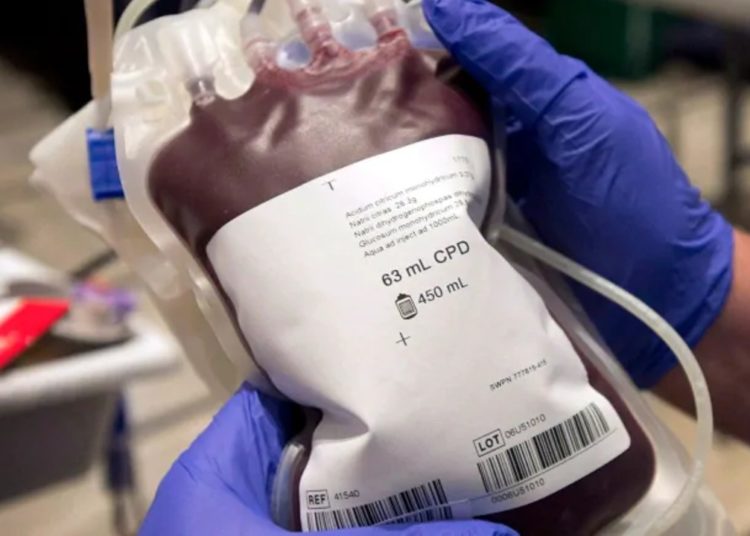Gripped by the choking menace of unregulated and nefarious blood practice in Nigeria, the federal government is ready to stem the frightening tide by weighing the big stick. Director General of the National Blood Service Commission, Dr Omale Joseph Amedu mni is driving the call to sanitize the country of unregulated blood services said, more than 90% of health facilities in Nigeria engage in unregulated blood activities as less than one per cent of health facilities involved in the blood business are registered with the commission.
Rising from an emergency parley with newsmen in Abuja recently, the commission which is the body saddled with the responsibility of coordinating and regulating the blood service and ensuring safe and adequate blood in Nigeria read what it calls a wake call to private, government and international blood practitioners.
With an ultimatum of 30 days, all the Federal Government hospitals, Federal Capital Territory health facilities, private hospitals, individuals, and international health facilities involved in blood transfusion, blood components separation, and apheresis in Nigeria are to register with the commission within this stipulated days or face sanctions as provided by the NHAct, 2014 and the NBSC Act, 2021.
This development is coming on the heels of several sharp practices going on within hospitals, especially in the tertiary and teaching hospitals. More than 90% of the hospitals in Nigeria are still going through the sharp practices of unregulated blood transfusion. The management of the hospital may not understand what is going on in their laboratory services. Again, if you get to hospitals, they will ask you two to three pints before your patient can be transfused, but many times these patients don’t even receive a pint of blood. Dr Amedu hinted.
Dr. Amedu recalled that: “Following the passage of the National Blood Service Commission Act, 2021, the Minister of Health, Dr. Osagie Ehanire, by way of Statutory instrument issues a circular NBTS/HQ/437/111/418 of October 20, 2021, to inform Ministries, Departments and Agencies of the status change of the NBTS to NBSC, aimed to coordinate, regulate and ensure the provision of quality blood, blood products and services in line with the national health plan as well as related matter.
“The circular, by extension informed all Nigerians, especially the stakeholders and those involved in blood businesses, as well as investors in the production of blood components to register their blood bank with the Commission.
“These include the Federal, states and FCT hospitals or health facilities, as well as private health facilities, and other sole blood establishment providing and blood and blood products in the country.”
Nigeria blood establishments as provided in S.48(1) a-c, (2) a-b of the National Health Act 2014, has it that any activity pertaining to the use of tissue, blood or blood products removed or withdrawn from living persons, administering of blood and blood products by medical practitioner or dentists and payment in connection with the importation, acquisition or supply of tissue, blood or blood products in Nigeria within the National Health Plan.
What this means is that the Commission will not tolerate any act of lawlessness and rascality which will affect the lives of millions of Nigeria in the long run, as “Needless to say, lawlessness and attitude of people towards regulatory compliance are difficult. “However, when dealing with human lives, the consequences of such actions may result in grave consequences, ranging from morbidity to actual loss of lives.
The Director General who is known to an irrepressible goal-getter has vowed not to allow people to transfuse infected and or expired blood to people as no blood shall be transfused anywhere in Nigeria without the NBSC seal of accreditation.
The takeaway from the press parley is captured thus;
“Anyone receiving blood or blood product transfusion in any health facility in Nigeria must ask to see the NBSC seal. No NBSC seal, do not accept the blood because it is not safe.”
The NBSC Director General, therefore, said: “I am to remind you that Sanctions for offenders are clearly enumerated in the NHAct 2014, S48(3) a-b, S49-51.
“All blood establishments, including healthcare facilities need to be appropriately regulated and coordinated.
“Rigorous process is involved in providing safe and quality blood and blood products, in terms of donor-selection, technical aspect of collection, storage, appropriate testing technology, cold-chain system, distribution and client protection as well as disposal of waste products.
“The commission recognized the need to develop guidance on establishing acceptable system for safety in blood transfusion.
“That was why an expert committee was inaugurated late 2021 to develop the guidelines using international best practices and came up with a national guideline and regulatory protocol for Nigeria in line with WHO guidelines.”
With an Amedu in the driving this call, be sure of having the safest blood in Nigeria.





